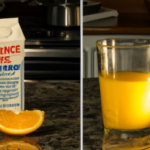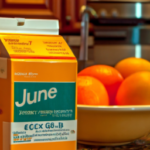Juice Tips and Tricks
How Long After Expiration Date Is Orange Juice Good

Being a lover of orange juice, I am always captivated by the perfect mix of sweetness and tartness in a refreshing glass every morning. However, I often find myself thinking about the expiration date of this delicious drink.
Have you ever looked at the expiration date on your carton of orange juice and wondered how long you have until it spoils? As it turns out, the answer isn’t as straightforward as we might hope.
Like many food products, orange juice comes with an expiration date to indicate the last day it is safe to consume. But what does that date really mean? Is it a hard and fast rule, or can we still enjoy our juice a few days after it expires?
In this article, we’ll explore the science behind expiration dates, how long orange juice lasts, and what happens when it goes bad. So grab a glass of OJ and let’s dive in!
Key Takeaways
- The shelf life of orange juice can be affected by temperature, light exposure, and container type.
- Proper storage in the refrigerator with a tight-fitting lid can extend its shelf life.
- Expired orange juice can pose health risks and should be disposed of properly.
- Understanding expiration dates and signs of spoilage can help make informed decisions on whether to consume or dispose of orange juice.
Understanding Expiration Dates
Do you ever wonder if that orange juice in your fridge is still good after the expiration date has passed? Understanding food safety is crucial when it comes to consuming perishable products. Food safety includes proper handling, storage, and preparation of food to prevent foodborne illnesses.
One of the simplest ways to ensure food safety is to read labels, especially the expiration date on food packaging. The expiration date is the date that manufacturers suggest the product should be consumed by for optimal quality and safety.
It’s important to note that expiration dates are not a guarantee of safety and don’t necessarily mean that the product is no longer safe to consume after that date. However, consuming expired products can increase the risk of foodborne illnesses.
Therefore, it’s essential to handle and store food properly and to use common sense when deciding whether to consume expired products. With that said, let’s dive into how long orange juice lasts after the expiration date.
How Long Does Orange Juice Last?
As someone who enjoys drinking orange juice, it’s important to know the factors that affect its shelf life, how to properly store it, and how to check for spoilage.
The shelf life of orange juice can be affected by factors such as temperature, light exposure, and the type of container it’s stored in. To ensure the longest shelf life possible, it’s important to store orange juice in the refrigerator and to consume it within a certain timeframe.
Checking for spoilage can be done by examining the color, smell, and taste of the juice.
Factors That Affect Shelf Life
To extend the shelf stability of orange juice, it’s important to consider the factors that affect its chemical composition and ultimately its deterioration process. One of the most important factors is proper storage.
Exposure to light and heat can accelerate the breakdown of the juice, leading to a shorter shelf life. For this reason, it’s recommended to store orange juice in a cool and dark place, away from direct sunlight and sources of heat.
Another factor that affects the shelf life of orange juice is the presence of oxygen. Oxygen can promote the growth of bacteria and mold, which can cause the juice to spoil faster. To minimize the presence of oxygen, it’s important to keep the container tightly sealed and to consume the juice within the recommended time frame.
By taking these factors into consideration, you can ensure that your orange juice stays fresh for as long as possible. Now, let’s move on to how to properly store orange juice to maximize its shelf life.
How to Store Orange Juice
Proper storage is crucial for maximizing the shelf life of your orange juice. Did you know that keeping orange juice at room temperature can cause it to spoil up to five times faster than when stored in a refrigerator? Here are some tips for storing your orange juice to keep it fresh for as long as possible:
-
Store in the refrigerator: As mentioned, keeping orange juice in the fridge is key to prolonging its shelf life. Make sure to store it at a temperature of 40°F or below.
-
Use airtight containers: Oxygen can cause the oxidation of orange juice, leading to spoilage. Use a container with a tight-fitting lid to prevent air from getting in.
-
Best storage containers: Glass or plastic containers are good options for storing orange juice. Avoid using aluminum or metal containers, as these can react with the juice and affect its taste.
By following these storage tips, you can prevent oxidation and keep your orange juice fresh for longer.
In the next section, we’ll discuss how to check for spoilage.
How to Check for Spoilage
Checking for spoilage is essential to ensure the safety and quality of the juice you consume. Orange juice that’s gone bad can be contaminated with harmful bacteria, yeast, or mold. These common contaminants can cause gastrointestinal problems, food poisoning, or even allergic reactions. Therefore, it’s crucial to know how to check for spoilage in orange juice.
One way to identify off flavors is by smelling the juice. If the orange juice has a sour, musty, or rancid smell, it’s likely spoiled. Another way to check for spoilage is by looking at the color and texture of the juice. If the juice has changed color or appears cloudy, it may indicate spoilage. Additionally, if the juice tastes different than usual, it may be a sign of contamination.
By checking for spoilage, you can prevent the consumption of spoiled orange juice and protect your health.
When orange juice expires, it undergoes a natural process of deterioration. The juice can lose its flavor, texture, and color. Additionally, expired orange juice can develop harmful bacteria that can cause food poisoning or other health issues. Therefore, it’s important to discard expired orange juice and replace it with fresh juice to ensure the safety and quality of your beverage.
What Happens When Orange Juice Expires?
When orange juice expires, it undergoes changes in taste and appearance that make it unsuitable for consumption. As the juice oxidizes, it may develop a sour or rancid taste and a cloudy or discolored appearance. Consuming expired juice can pose health risks, including the potential for foodborne illness.
Proper disposal of expired juice is important to prevent contamination and environmental harm.
Changes in Taste and Appearance
As orange juice nears its expiration date, changes in its texture, taste, and appearance may occur. The juice may start to feel thicker or grainy, with visible sediments or cloudiness. This is due to the breakdown of the pulp and the separation of the juice from the fruit solids.
Microbial growth may also occur, leading to off-flavors and odors. The juice may taste sour, bitter, or metallic, with a slight pungency or astringency. The color of the juice may also darken, indicating the oxidation of the pigments and the loss of nutritional value.
These changes in taste and appearance of expired orange juice may pose risks to the consumer. Drinking expired juice may cause food poisoning, stomach upset, or allergic reactions, especially in people with weakened immune systems, allergies, or sensitivities.
The bacterial and fungal contaminants in the juice can cause infections, such as salmonella, E. coli, or botulism, which can lead to severe illness or even death. Therefore, it’s important to discard any expired orange juice and to consume only fresh, properly stored, and pasteurized juice.
Risks of Consuming Expired Juice
If you consume expired juice, you put yourself at risk for food poisoning and other illnesses caused by bacterial and fungal contamination, which affects around 48 million people every year in the US alone. Drinking expired juice can lead to serious health risks because the expiration date marks the point at which the juice may contain harmful bacteria and other pathogens that can cause illness.
Here are five reasons why you should avoid consuming expired juice:
- Expired juice may contain harmful bacteria that can cause food poisoning, leading to symptoms such as nausea, vomiting, and diarrhea.
- Drinking expired juice can also cause fungal infections, which can lead to serious health problems, especially for people with weakened immune systems.
- Expired juice may also contain harmful chemicals that have formed as a result of the breakdown of the juice over time.
- Consuming expired juice can also cause allergic reactions in some people, especially if the juice contains ingredients that they’re allergic to.
- Finally, drinking expired juice can lead to a bad taste in your mouth and a decrease in the nutritional value of the juice.
It’s important to dispose of expired juice properly to avoid any health risks.
How to Dispose of Expired Juice
To properly dispose of expired juice, simply pour it down the drain or into a compost bin. It’s important to dispose of expired juice safely to avoid potential health hazards and minimize the environmental impact of improper juice disposal.
Pouring expired juice down the drain is a safe and easy option, as long as your local wastewater treatment plant can handle it. If you prefer a more environmentally friendly option, you can also dispose of expired juice in a compost bin. The natural acids in the juice can help break down organic matter and create nutrient-rich compost. However, be sure to check with your local composting facility to make sure they accept liquids.
Properly disposing of expired juice is crucial for both your health and the environment. Now, let’s explore whether it’s safe to drink orange juice after the expiration date.
Can You Drink Orange Juice After the Expiration Date?
Hey, have you ever wondered if you can gulp down that glass of orange juice after the expiration date? The answer is not straightforward as it depends on various factors such as the storage conditions, the type of orange juice, and the presence of any visible signs of spoilage. However, it’s generally not recommended to consume expired juice as it may pose health risks.
To evoke a sense of caution and concern in the audience, consider these bullet points:
-
Alternatives to drinking expired juice: opt for freshly-squeezed juice, freeze the juice before it expires, or use it in recipes that require cooking.
-
Health risks associated with consuming expired juice: expired juice may contain harmful bacteria that can cause foodborne illnesses such as nausea, vomiting, and diarrhea. It may also lose its nutritional value and taste unpleasant.
Given the potential risks, it’s crucial to prioritize food safety and avoid consuming expired juice. Instead, focus on extending the shelf life of orange juice by following our tips in the next section.
Tips for Extending the Shelf Life of Orange Juice
As someone who frequently enjoys orange juice, I’ve learned the importance of properly storing it to extend its shelf life.
One technique is to keep it refrigerated at a consistent temperature between 32 and 40 degrees Fahrenheit.
Additionally, freezing orange juice in an airtight container can preserve its freshness for several months.
Finally, mixing it with other beverages, such as soda or sparkling water, can add variety and potentially extend its life by diluting the acidity.
Proper Storage Techniques
Storing your orange juice properly is crucial to extending its shelf life beyond the expiration date. Proper handling and transportation of orange juice is important to ensure that it stays fresh for as long as possible. Orange juice should always be refrigerated and tightly sealed to keep out any air that could cause it to spoil faster.
Temperature also plays a significant role in the quality of orange juice. Orange juice should be kept at a temperature between 32 and 40 degrees Fahrenheit, as this is the optimal temperature range for orange juice. Temperatures that are too high or too low can affect the flavor and quality of the juice.
By properly storing and handling your orange juice, you can help ensure that it stays fresh and tasty for as long as possible.
When it comes to freezing orange juice, there are a few things to keep in mind.
Freezing Orange Juice
To keep your refreshing morning drink at its best, you might want to consider freezing it using these simple steps. First, make sure to transfer the orange juice into a freezer-safe container, leaving some headspace for expansion.
Next, label the container with the date it was frozen to keep track of its shelf life. Place the container in the freezer and make sure to keep the temperature at or below 0°F. Frozen orange juice can last up to 8-12 months if stored properly.
Freezing orange juice not only extends its shelf life, but it also has its alternative uses and nutritional benefits. Frozen orange juice can be used as a flavoring for smoothies, cocktails, and other beverages. It’s also a great source of vitamin C, which can boost your immune system and protect against free radicals.
Mixing frozen orange juice with other beverages can create a refreshing and nutritious drink that can be enjoyed at any time of the day.
Mixing with Other Beverages
You can enhance the flavor and nutritional value of your drinks by incorporating frozen orange juice into your favorite beverages. One of the best things about using frozen orange juice is that it can be mixed with a variety of drinks. The mixing ratios will depend on your personal preferences and the type of drink you are making.
For example, when mixing with water, a recommended ratio is one part frozen orange juice to three parts water. However, if you’re making a smoothie, you can use a higher ratio of frozen orange juice to create a more intense orange flavor.
Some popular combinations include mixing frozen orange juice with lemonade, iced tea, or even soda. The orange flavor adds a refreshing twist to these classic drinks. Additionally, the vitamin C and other nutrients in orange juice can boost the nutritional value of your beverage.
It’s important to note that while frozen orange juice can be a great addition to your drinks, it’s still important to pay attention to the expiration date and use it before it goes bad.
Other factors to consider when incorporating frozen orange juice into your drinks include the texture and consistency. Depending on the type of drink you’re making, you may want to adjust the amount of frozen orange juice to achieve the desired texture. Additionally, if you’re using frozen orange juice that’s been stored for a long time, it may be more difficult to mix and could affect the overall taste of your beverage.
By keeping these factors in mind, you can create delicious and nutritious drinks using frozen orange juice.
Other Factors to Consider
As we conclude our discussion on extending the shelf life of orange juice, let me recap some key points we’ve covered.
Proper storage and refrigeration are crucial in maintaining the quality and safety of orange juice. Additionally, understanding the expiration dates and signs of spoilage can help you make informed decisions about consuming or discarding orange juice.
In closing, I recommend that you always follow good hygiene practices when handling and storing orange juice. Always check the expiration dates and discard any juice that shows signs of spoilage, such as off-flavors or odors.
By taking these simple steps, you can ensure that you’re enjoying the freshest and safest orange juice possible.
Recap of Key Points
After the expiration date, orange juice may still be safe to consume for a few days, but its nutritional value and flavor will start to decline. The storage method of the juice plays a significant role in how long it remains good after the expiration date. Storing it in the refrigerator can help to extend its shelf life, while leaving it at room temperature can cause it to spoil faster.
Choosing the best brands of orange juice can also make a difference in how long it lasts. High-quality brands tend to have better packaging and processing methods, which can help to keep the juice fresher for longer. It’s essential to keep these factors in mind to ensure that you’re getting the most out of your orange juice.
With that said, let’s move on to final thoughts and recommendations.
Final Thoughts and Recommendations
To recap, we’ve learned that the expiration date on orange juice isn’t a hard and fast rule. While most orange juice will last up to a week after the printed date, it’s important to use your senses to determine if it’s still good to drink. The color, smell, and taste of the juice can all indicate if it has spoiled or not.
Moving forward, it’s important to note that orange juice can still be useful even if it’s past its expiration date. With a little creativity, you can use expired orange juice to make delicious smoothies or use it as a marinade for meats. Additionally, orange juice is packed with nutritional benefits such as vitamin C, folate, and potassium. Incorporating orange juice into your diet can be a great way to boost your immune system and improve your overall health.
As we’ve seen, orange juice can still be consumed past its expiration date if it’s still good to drink. With creative recipe ideas and its numerous nutritional benefits, orange juice is a versatile and healthy addition to any diet. However, if you’re unsure if your orange juice is still good, it’s always better to err on the side of caution and throw it out.
In the next section, we’ll explore additional resources to help you make informed decisions about food safety.
Additional Resources
Hey, check out these extra resources for more information on how long you can keep drinking your expired orange juice! Here are some great sources to help you determine the safety and quality of your orange juice after its expiration date:
-
The USDA’s FoodKeeper App: This app provides storage timelines for various foods, including orange juice. Simply input the type of juice and its expiration date, and the app will give you guidance on how long it can be safely consumed.
-
StillTasty.com: This website offers a comprehensive database of expiration dates and storage recommendations for various foods, including orange juice. It also includes user-submitted comments and questions, which can provide additional insight into the shelf life of your juice.
-
The National Center for Home Food Preservation: This organization provides research-based information on food preservation and safety, including tips for extending the life of your orange juice. They also offer juicing recipes that can help you make the most of your expired juice.
If you’re unsure about whether your orange juice is still good to drink, it’s always better to err on the side of caution and dispose of it. However, with the help of these resources, you can make informed decisions about the safety and quality of your juice.
Now, let’s move on to the glossary section where we can learn more about the technical terms related to orange juice storage and safety.
Glossary
In this subtopic, I’ll be discussing the glossary of key terms and definitions related to expiration dates and food safety. It’s important to understand these terms to properly handle and consume food products.
This glossary will also include a pronunciation guide for any unfamiliar words.
Some key terms include:
- Expiration date: The date after which a product should not be consumed for quality or safety reasons.
- Best by date: The date after which a product may start to lose quality, but is still safe to consume.
- Sell by date: The date by which a product should be sold by, but does not indicate food safety.
- Use by date: The date after which a product should not be consumed for safety reasons.
- Foodborne illness: An illness caused by consuming contaminated food or beverage.
- Cross-contamination: The transfer of harmful bacteria or other substances from one food to another.
- Temperature danger zone: The range of temperatures between 40°F and 140°F where bacteria can grow rapidly.
- Sanitation: The process of cleaning and disinfecting surfaces, equipment, and utensils to prevent the spread of harmful substances.
Remember, it’s always better to be safe than sorry when it comes to food safety!
Key Terms and Definitions
Let’s dive into the world of orange juice and understand some key terms and definitions related to its preservation and expiry prevention.
Orange juice preservation refers to the process of maintaining the quality and freshness of the juice for an extended period. This process involves reducing the growth of microorganisms, which can cause spoilage of the juice. The most commonly used method for orange juice preservation is pasteurization, which involves heating the juice to a specific temperature and then cooling it rapidly. This process kills bacteria and extends the shelf life of the juice.
On the other hand, expiry prevention refers to the steps taken to prevent orange juice from going bad before its expiry date. One of the most effective ways to prevent expiry is by storing the juice in a cool and dry place. Exposure to light and heat can speed up the oxidation process, leading to a shorter shelf life of the juice. It’s also important to consume the juice before the expiry date printed on the label. While orange juice can still be consumed after its expiry date, its quality and nutritional value may be compromised.
With these key terms and definitions in mind, let’s move on to the pronunciation guide.
Pronunciation Guide
Are you struggling to pronounce the different words related to orange juice preservation and expiry prevention? Don’t worry, you’re not alone. As someone who has studied the subject extensively, I know that there are many pronunciation examples and common mispronunciations that can trip people up.
To help you out, I’ve compiled a table of some of the most commonly mispronounced words related to orange juice preservation and expiry prevention. Take a look:
| Word | Pronunciation |
|---|---|
| Microorganisms | my-kroh-or-ga-niz-uhmz |
| Pasteurization | pas-ter-uh-zey-shuhn |
| Expiration | eks-puh-rey-shuhn |
By learning the correct pronunciation of these words, you’ll be better equipped to understand the science of orange juice preservation and expiry prevention. So don’t be afraid to ask for help or practice in front of a mirror to improve your pronunciation skills.
Frequently Asked Questions
Is it safe to drink orange juice that has gone bad?
Personally, I wouldn’t risk drinking spoiled orange juice due to the potential health risks. Instead, consider alternatives like freshly squeezed juice or a different beverage altogether. It’s always better to err on the side of caution.
Can you freeze orange juice to extend its shelf life?
To extend the shelf life of orange juice, freezing techniques can be utilized. Follow preservation tips such as filling containers leaving room for expansion, labeling with the date, and thawing in the refrigerator.
How can you tell if orange juice has gone bad?
Opening a carton of spoiled orange juice is like a punch in the gut. To evaluate freshness, check for changes in color, smell, and taste. Discard if necessary. Store in a cool, dark place for longevity.
What are some common signs of spoilage in orange juice?
To determine if orange juice has spoiled, look for signs such as a sour smell, mold, or a change in color or texture. Proper storage can help avoid spoilage. If orange juice has gone bad, dispose of it properly to prevent foodborne illness.
How long does unopened orange juice last?
Unopened orange juice can last up to two weeks in the fridge. To keep it fresh, store it at 40°F or lower. Some of the best brands include Tropicana, Simply Orange, and Minute Maid. Once opened, it’s best to consume the juice within 7-10 days for optimal freshness and taste. If you’re wondering **how long does fresh juice last**, homemade or freshly squeezed juice generally stays fresh for about 2-3 days in the fridge, provided it’s stored in an airtight container. Always check for any changes in smell, taste, or appearance before drinking.
Conclusion
In conclusion, understanding expiration dates is crucial for ensuring the safety and quality of our food and drinks. As for orange juice, it generally lasts for about 5-7 days beyond the expiration date if stored properly in the fridge. However, it’s important to keep in mind that the freshness and taste may deteriorate over time, and consuming expired orange juice can lead to health risks. Therefore, it is always recommended to inspect the smell, taste, and appearance of the juice before consuming it. If you decide to drink juice after expiration, be aware that there may be changes in quality that could pose potential health hazards. When in doubt, it’s safer to discard the expired juice and opt for a fresh option.
One interesting statistic to note is that, according to a study by the Natural Resources Defense Council, Americans waste approximately $218 billion worth of food each year. ‘Use by’ and ‘best before’ dates play a significant role in this waste. This highlights the importance of understanding expiration dates and making conscious efforts to reduce food waste.
By properly storing and consuming orange juice before it expires, we can not only save money but also contribute to a more sustainable food system.
Cindy thoroughly researches juicing trends, techniques, and recipes to provide readers with practical advice and inspiration. Her writing style is accessible, engaging, and designed to make complex concepts easy to understand. Cindy’s dedication to promoting the advantages of juicing shines through her work, empowering readers to make positive changes in their lives through the simple act of juicing.
Juice Tips and Tricks
How to Make Aloe Vera Juice Taste Better

Tired of the strong flavor of aloe vera juice? No problem, we’ve got the answer for you.
In this article, we’ll share some tips and tricks to make your aloe vera juice taste better. We have tried and tested various methods to enhance the flavor without compromising the health benefits.
From choosing the right juice to adding natural sweeteners and infusing with fruits and herbs, we’ve got all the information you need to transform your aloe vera juice into a delightful and refreshing beverage.
Let’s dive in!
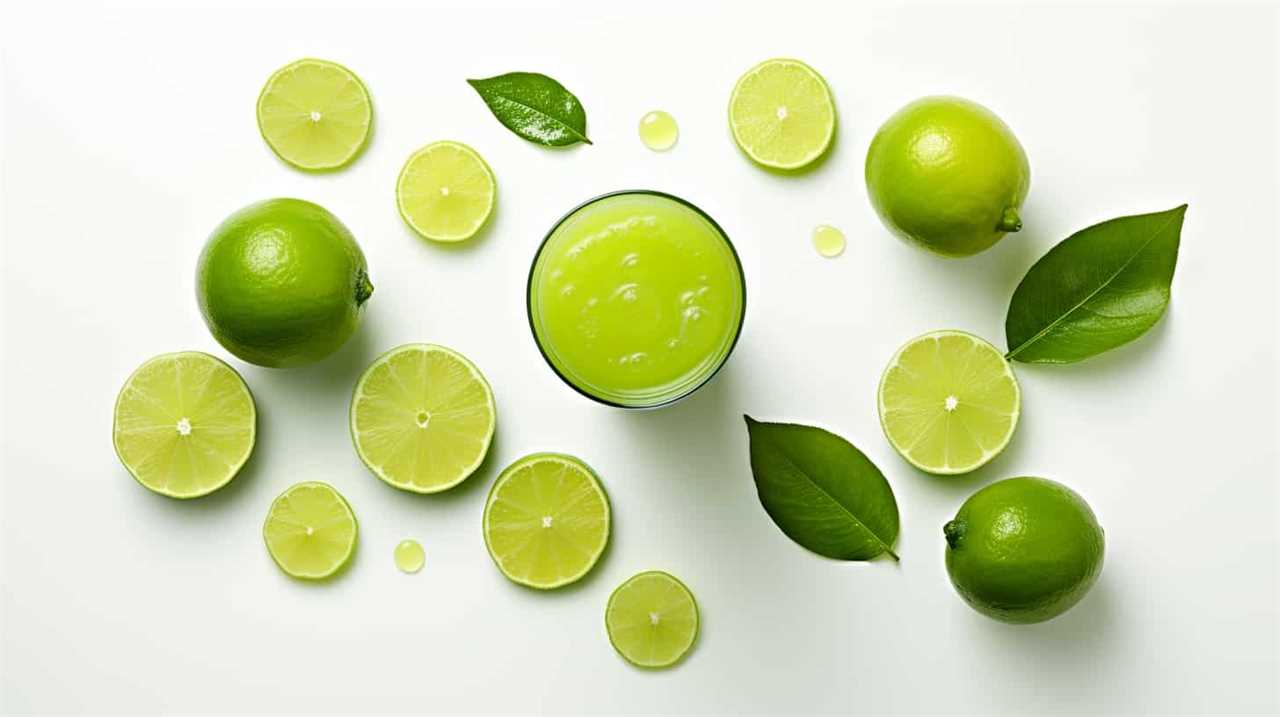
Key Takeaways
- Choose a reputable brand of aloe vera juice that prioritizes quality and uses organic, pure aloe vera.
- Avoid brands that contain added sugars or artificial ingredients.
- Use natural sweeteners like honey, agave syrup, or stevia to enhance the taste of aloe vera juice.
- Experiment with adding fruits, herbs, and other juices to create unique flavor combinations and enhance the health benefits of aloe vera juice.
Choosing the Right Aloe Vera Juice
We can enhance our experience with aloe vera juice by selecting the right brand and type for our preferences. When it comes to finding a reputable brand, it’s important to do some research and read reviews from other consumers. Look for brands that prioritize quality and use organic, pure aloe vera without any added sugars or artificial ingredients. Understanding the health benefits of aloe vera juice is also crucial in making the right choice. Aloe vera is known for its soothing properties, aiding digestion, promoting skin health, and boosting the immune system. By choosing a high-quality brand, we can ensure that we’re getting the maximum benefits from our aloe vera juice.
Now that we know how to choose the right brand, let’s move on to the next step of adding natural sweeteners.
Adding Natural Sweeteners
To enhance the flavor of our aloe vera juice, we can add natural sweeteners such as honey or agave syrup. Using alternative sweeteners not only adds sweetness but also brings unique flavors to the juice. Here are some options to consider:
- Stevia: A natural sweetener derived from the Stevia plant, it’s a zero-calorie alternative to sugar.
- Maple Syrup: This natural sweetener adds a rich and earthy flavor to the aloe vera juice.
- Dates: Pureed dates can be used to sweeten the juice while also providing essential nutrients like fiber.
In addition to using alternative sweeteners, we can enhance the flavor of aloe vera juice by adding spices and extracts. Cinnamon, ginger, or vanilla extract can add warmth and depth to the taste. By experimenting with different combinations of these natural sweeteners, spices, and extracts, we can create a flavor profile that suits our preferences.
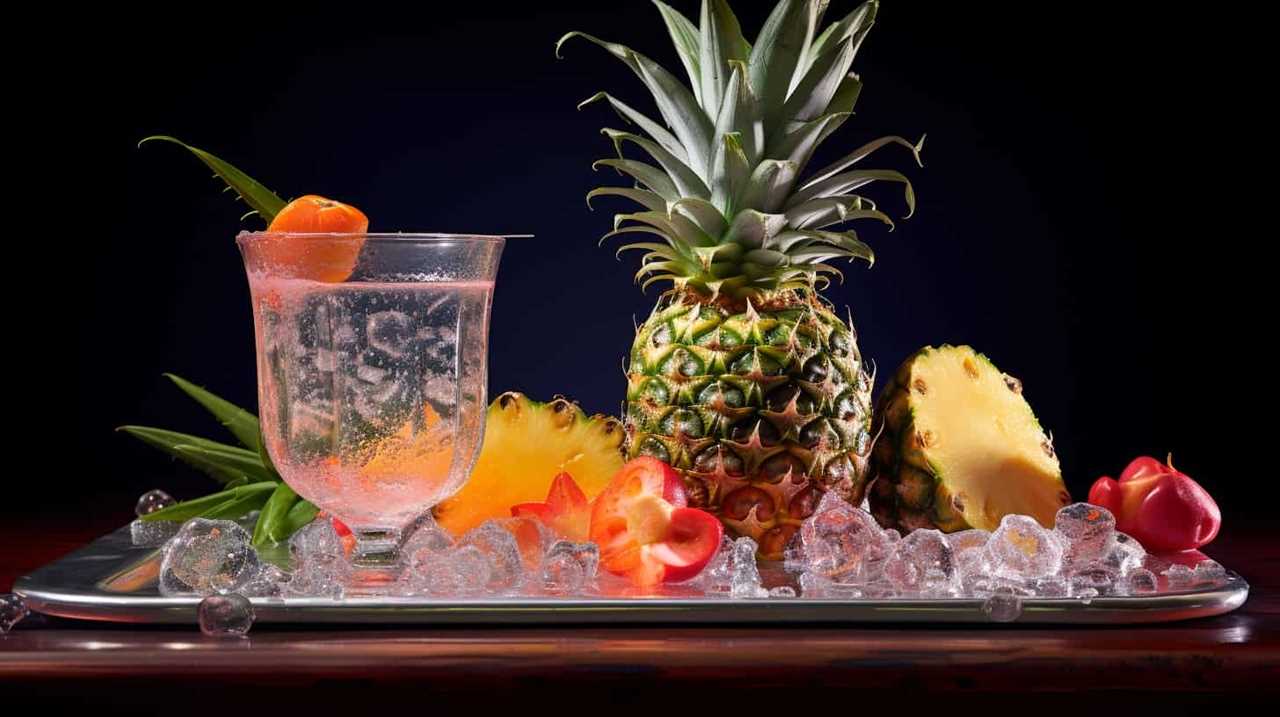
Now, let’s move on to the next section and learn how to infuse aloe vera juice with fruits and herbs to further enhance its taste.
Infusing With Fruits and Herbs
As we explore ways to make our aloe vera juice taste better, one option to consider is infusing it with fruits and herbs. Creating unique aloe vera blends by adding fruits and herbs not only enhances the flavor but also adds a touch of freshness and complexity to the juice. For example, combining aloe vera juice with lemon, mint, or berries can create a refreshing drink that’s both delicious and packed with additional nutrients. It’s similar to the ease of making lemonade with bottled juice—quick, convenient, and customizable to suit your preferences. By experimenting with different fruit and herb combinations, you can elevate your aloe vera juice experience while still reaping its health benefits.
Fruits like strawberries, pineapple, or citrus can add a burst of sweetness, while herbs like mint, basil, or ginger can provide a subtle yet refreshing twist. Exploring the benefits of herbal infusions can also be beneficial for our health. For example, adding a few sprigs of lavender can promote relaxation and reduce stress. Additionally, infusing aloe vera juice with rosemary can aid digestion and boost the immune system.
Blending With Other Juices
Let’s try mixing aloe vera juice with different fruit juices to create delicious and refreshing blends. Blending aloe vera juice with other fruits not only enhances its taste but also adds nutritional benefits to your drink. Here are three fruit juices that you can mix with aloe vera juice:

- Orange juice: Combining aloe vera juice with orange juice not only adds a tangy flavor but also boosts your intake of vitamin C, which is essential for a strong immune system.
- Pineapple juice: Mixing aloe vera juice with pineapple juice creates a tropical blend that isn’t only refreshing but also helps in digestion. Pineapple contains bromelain, an enzyme that aids in breaking down proteins and promoting better digestion.
- Watermelon juice: Blending aloe vera juice with watermelon juice creates a hydrating and refreshing combination. Watermelon is rich in water content and contains electrolytes that can help replenish your body’s fluids.
Experimenting With Flavor Combinations
While we can try various flavor combinations with aloe vera juice, it’s important to find the right balance to enhance its taste. Experimenting with different flavors can’t only make the juice more enjoyable but also enhance its health benefits.
Aloe vera juice is known for its numerous health benefits, such as boosting digestion, promoting hydration, and supporting the immune system. By adding complementary flavors, we can create a refreshing summer drink that not only tastes great but also provides a nutritional boost.
Some popular flavor combinations include mixing aloe vera juice with citrus fruits like lemon or orange, adding a splash of coconut water for a tropical twist, or combining it with cucumber and mint for a refreshing and cooling effect.
Don’t be afraid to get creative and find the flavor combination that suits your taste buds best!
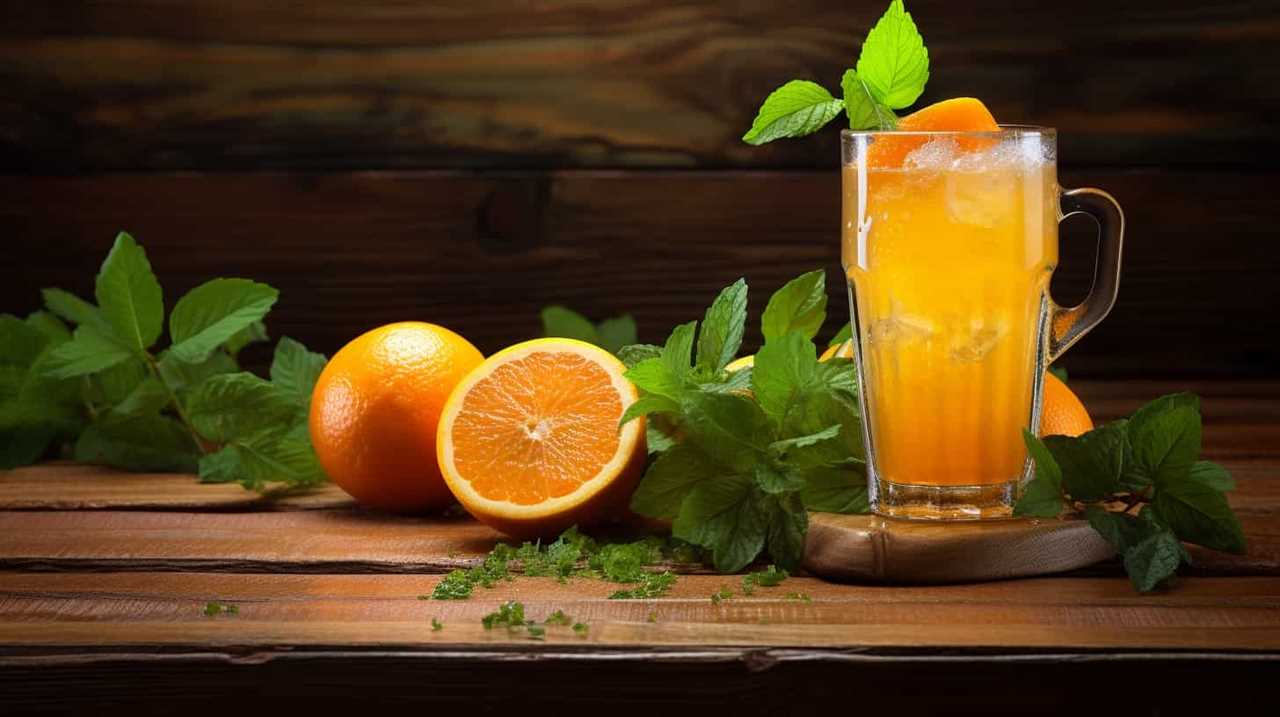
Frequently Asked Questions
Can I Use Store-Bought Aloe Vera Gel Instead of Fresh Aloe Vera for Making Juice?
Yes, you can use store-bought aloe vera gel instead of fresh aloe vera for making juice. However, it’s important to note that fresh aloe vera juice may have more health benefits due to its higher nutrient content.
How Long Can I Store Aloe Vera Juice in the Refrigerator?
Aloe vera juice can be stored in the refrigerator for up to a week. Refrigeration helps maintain the longevity and freshness of the juice, preserving its beneficial properties. It’s important to store the juice in an airtight container to prevent contamination and maintain its quality. Similarly, you might wonder *how long ginger juice lasts*; typically, fresh ginger juice can be refrigerated for about 1–2 weeks as well. Both aloe vera and ginger juices are best consumed within their shelf life to ensure maximum potency and health benefits. Additionally, freezing either juice can extend their shelf life, though some loss of nutrients and potency may occur during the process. When thinking about *how long fresh juice lasts*, it’s crucial to check for signs of spoilage, such as changes in smell, taste, or color, before consuming. To enjoy the best results, it’s always recommended to use fresh ingredients and properly store the juice to ensure you’re getting the most out of its health benefits.
Can Aloe Vera Juice Help With Digestive Issues?
Aloe vera juice can potentially help with digestive issues when taken in appropriate dosages. However, it is important to note that there may be potential side effects. It is always best to consult with a healthcare professional before starting any new supplement regimen.
Can I Use Artificial Sweeteners Instead of Natural Sweeteners in My Aloe Vera Juice?
Using artificial sweeteners in aloe vera juice may affect its taste and potential health benefits. However, natural sweeteners like honey or stevia can enhance the flavor without compromising its nutritional value.

Is It Safe to Drink Aloe Vera Juice Every Day?
Drinking aloe vera juice daily can have numerous benefits, such as improving digestion and boosting the immune system. However, consuming it regularly may also lead to potential side effects like diarrhea or stomach cramps.
Conclusion
In conclusion, making aloe vera juice taste better is easy and enjoyable.
By choosing the right aloe vera juice and adding natural sweeteners, infusing with fruits and herbs, blending with other juices, and experimenting with flavor combinations, you can create a delightful and refreshing drink.
So go ahead and unleash your creativity in the kitchen, and transform your aloe vera juice into a sensational elixir that will transport your taste buds to paradise.
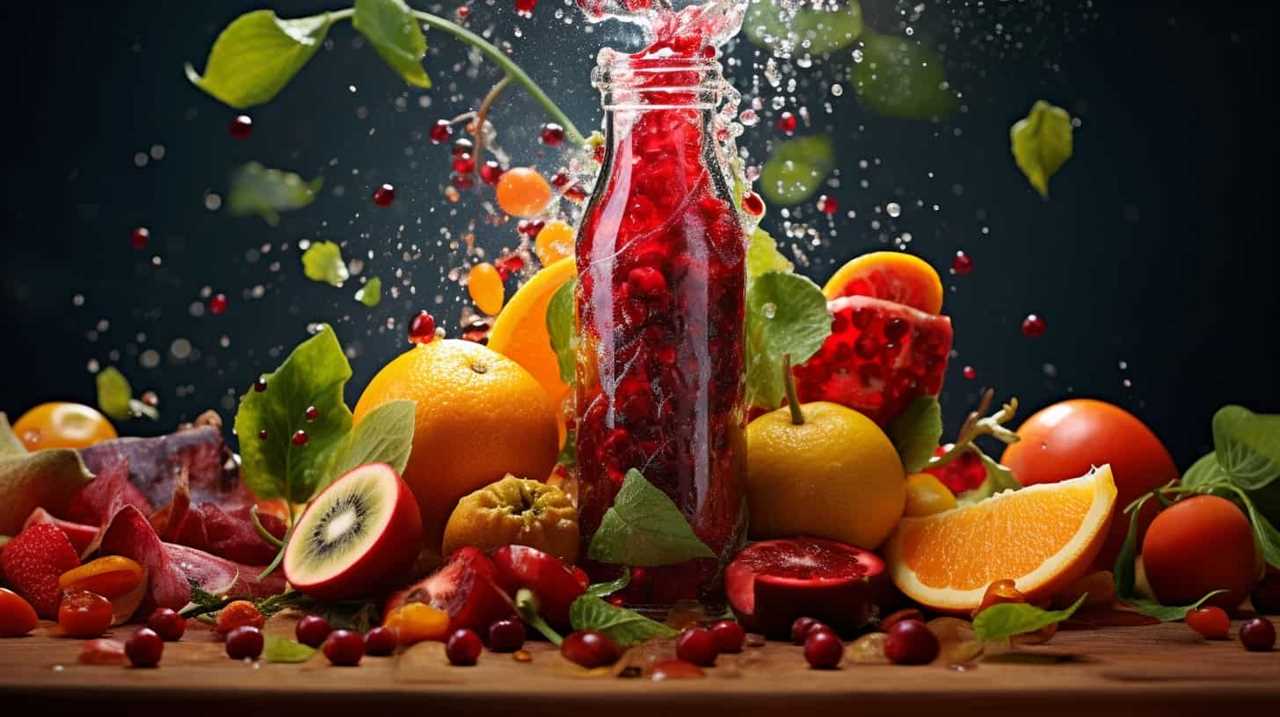
Susannah expertise lies in researching and compiling evidence-based content on juicing, nutrition, and overall health. She is committed to ensuring that The Juicery World offers accurate, up-to-date, and trustworthy information to empower readers to take control of their health. Susannah’s goal is to inspire individuals to embrace juicing as a way to nourish their bodies and live their best lives.
Juice Tips and Tricks
How to Make a Glass of Lemonade With Bottled Lemon Juice

Are you craving a cool glass of lemonade to quench your thirst? Look no further! Try out our perfect recipe using bottled lemon juice that will surely please your taste buds.
In this article, we’ll guide you through the process of creating a tangy and sweet concoction that will leave you feeling refreshed and satisfied.
So grab your ingredients and let’s get started on this delightful journey of serving ourselves and others a glass of pure lemony goodness.
Key Takeaways
- Consider the storage of the bottled lemon juice (dark glass or plastic bottles, protect from light exposure, check expiration date)
- Choose a suitable pitcher and fresh lemons for enhanced flavor
- Store the lemonade concentrate in the refrigerator to maintain freshness
- Adjust the sweetness and tartness to taste with sugar or more lemon juice, and experiment with different sweeteners or additional flavors.
Choosing the Right Bottled Lemon Juice
What are the key factors we should consider when selecting the right bottled lemon juice for our lemonade?

One important factor is how the lemon juice is stored. Look for bottles that are made of dark glass or plastic, as they help protect the juice from light exposure, which can degrade its quality. It’s also important to check the expiration date to ensure freshness.
Another benefit of using bottled lemon juice is convenience. It saves time and effort compared to squeezing fresh lemons. Additionally, bottled lemon juice provides consistent flavor, as the acidity levels are standardized.
When selecting a brand, consider reading reviews and checking for certifications, such as organic or non-GMO.
Gathering the Necessary Ingredients and Tools
How can we gather all the necessary ingredients and tools to make a glass of lemonade with bottled lemon juice? First, we’ll need to collect bottled lemon juice, sugar, and cold water, as well as a pitcher and a spoon for mixing. If you prefer extra flavor, you can also gather ice and optional add-ins like mint or soda water. While preparing the lemonade, it’s easy to understand why some people wonder about other citrus drinks and may ask, “how many oranges per gallon” are needed when making orange juice instead. Once everything is assembled, combine the lemon juice, sugar, and water in the pitcher, stirring until the sugar dissolves. Feel free to adjust the sweetness or tartness to your liking, and don’t forget to add ice or any optional add-ins for an extra refreshing touch. This process might even make you curious about how much juice from oranges is needed when making fresh orange juice compared to using bottled citrus products. Once your lemonade is ready, pour it into a glass and enjoy the refreshing taste. This simple recipe can inspire you to try other homemade juices, such as learning **how to make pear juice** or experimenting with other fruit combinations. Whether you’re using fresh fruits or bottled options, creating your own beverages is a fun and rewarding way to personalize your drinks.
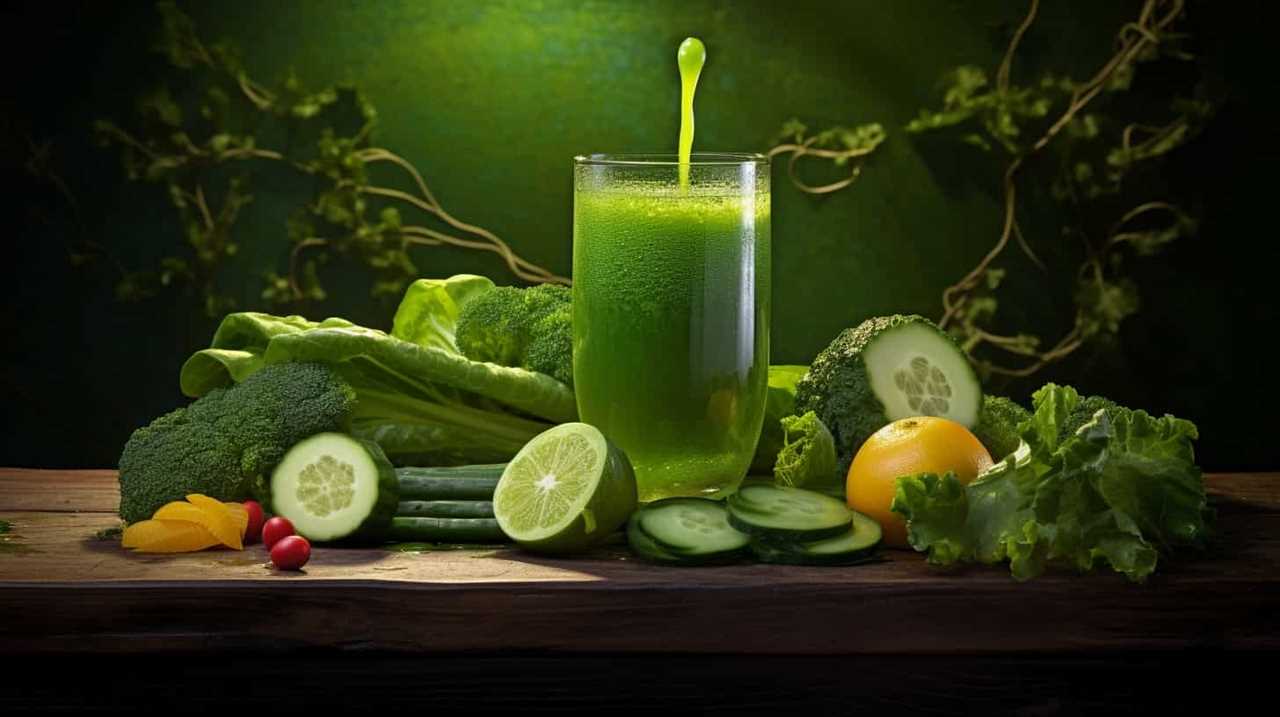
It’s important to start with the right pitcher. Look for a pitcher that’s made of glass or BPA-free plastic, as these materials won’t affect the taste of the lemonade. The pitcher should also have a lid or cover to keep the lemonade fresh and prevent spills.
Now, let’s talk about the lemons. While bottled lemon juice is convenient, using fresh lemons instead can elevate the flavor of your lemonade. Choose lemons that are firm and have a bright yellow color. Give them a gentle squeeze to ensure they’re juicy. To extract the juice, you’ll need a citrus juicer or a reamer. These tools make it easy to get every last drop of juice from the lemons.
Mixing the Lemonade Concentrate
To start mixing the lemonade concentrate, we’ll slowly pour the bottled lemon juice into the pitcher. It’s important to choose the right container for the lemonade concentrate. A pitcher with a lid or a tightly sealed container will help maintain the freshness and prevent any spills or leaks. Once the lemon juice is in the pitcher, we can move on to the next step of adding water and sweetener.
To ensure the lemonade concentrate stays fresh, it’s essential to store it properly. Keep the pitcher in the refrigerator to maintain its cool temperature and prevent any bacteria growth. If you have any leftover concentrate, transfer it to a smaller container with an airtight lid before refrigerating. This will help retain its flavor and prevent any contamination.
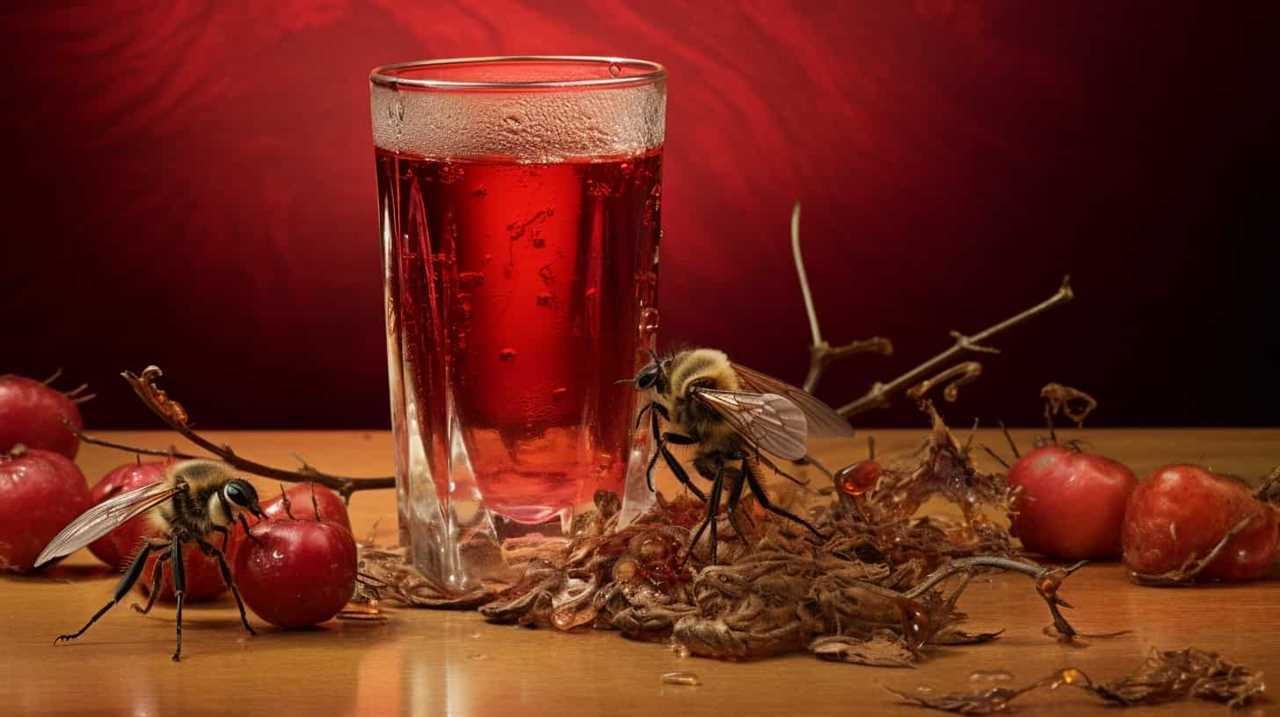
Now that we’ve mixed the lemonade concentrate, it’s time to adjust the sweetness and tartness to taste.
Adjusting the Sweetness and Tartness to Taste
We can adjust the sweetness and tartness of the lemonade to taste by adding more sugar or lemon juice, respectively. If you prefer a sweeter lemonade, simply add more sugar and stir until it dissolves completely. You can experiment with different sweeteners such as honey or agave syrup to find the perfect balance of sweetness.
On the other hand, if you want a tangier lemonade, add more lemon juice gradually, tasting as you go until it reaches your desired level of tartness.
Additionally, you can get creative with your lemonade by adding flavors like fresh mint leaves or a hint of lavender. These additions can elevate the flavor profile and create a more refreshing and unique experience.
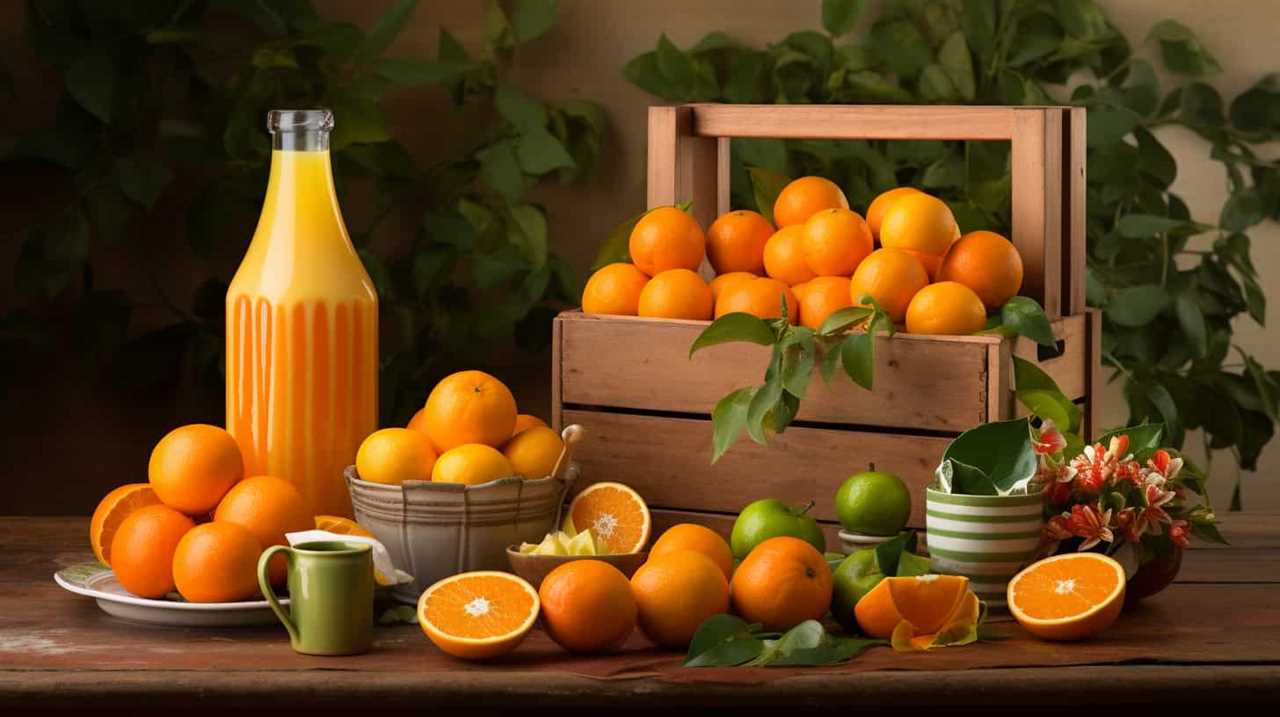
Now that we’ve adjusted the sweetness and tartness of our lemonade, let’s move on to serving and enjoying your refreshing glass of lemonade.
Serving and Enjoying Your Refreshing Glass of Lemonade
Now let’s sit back, relax, and savor our refreshing glass of lemonade.
When it comes to serving and enjoying this delightful drink, there are a few techniques and garnishing options to consider.
Firstly, serving your lemonade chilled is essential for maximum enjoyment. Ensure that you have chilled glasses or add ice cubes to the glasses before pouring the lemonade.

To add a touch of elegance, you can garnish your lemonade with a slice of lemon on the rim of the glass. For an extra burst of flavor, you could also add a sprig of fresh mint or a few berries.
Remember to gently stir the lemonade before serving to evenly distribute the flavors.
Now, take a sip, feel the refreshing tang of lemon, and let the sweet and tart flavors dance on your taste buds.
Cheers!
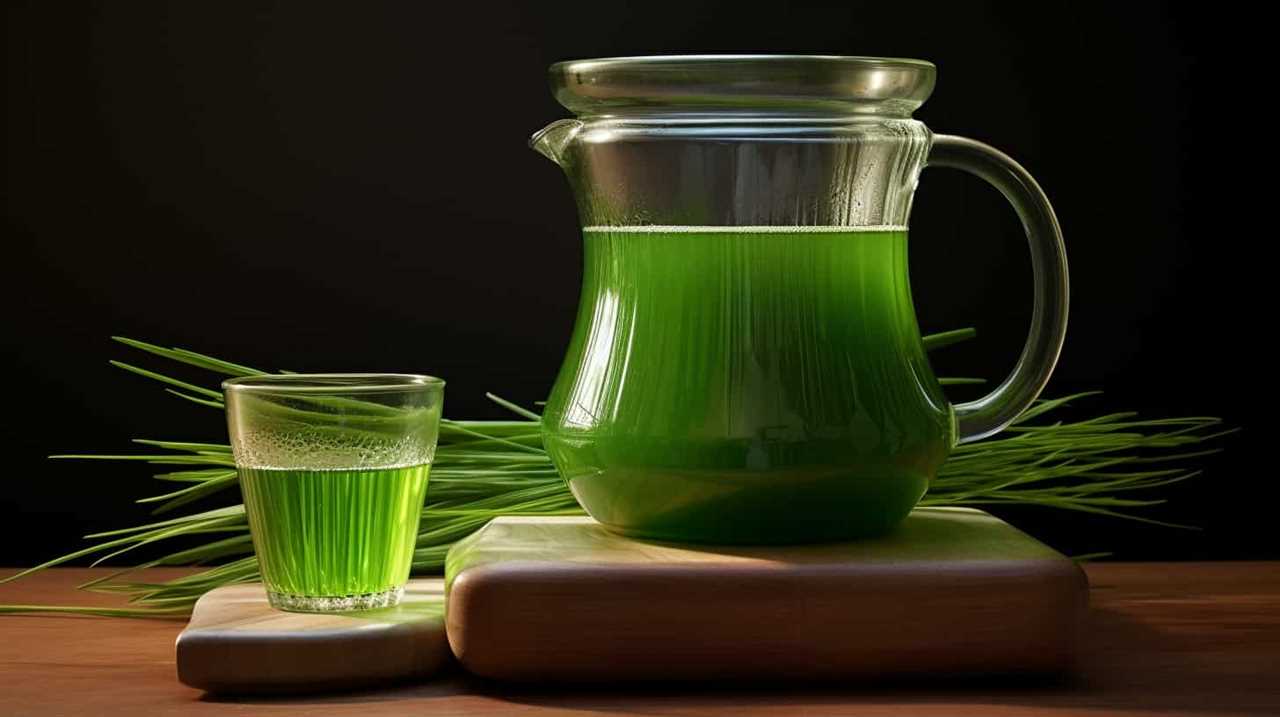
Frequently Asked Questions
Can I Use Fresh Lemons Instead of Bottled Lemon Juice?
Fresh lemons offer numerous benefits over bottled lemon juice. The taste of fresh lemons is unparalleled, providing a vibrant and tangy flavor. Incorporating fresh lemons into your lemonade will elevate its taste and give it a refreshing and authentic twist.
Can I Substitute Sugar With a Different Sweetener?
Substituting sweeteners in lemonade can enhance the flavor and offer health benefits. We’re knowledgeable about alternative sweeteners and can provide precise, detailed instructions on using them in place of sugar.
How Long Does the Lemonade Concentrate Need to Chill in the Refrigerator?
The chilling time for the lemonade concentrate in the refrigerator is typically around 1-2 hours. Using bottled lemon juice offers the benefit of convenience and consistent flavor for a refreshing glass of lemonade.
Can I Add Other Fruits or Flavors to the Lemonade?
Sure, we can definitely add different fruits or flavors to our lemonade. It’s a great way to experiment with unique flavors and create refreshing, personalized drinks. The possibilities are endless!

How Long Does the Lemonade Stay Fresh in the Refrigerator?
Lemonade made with bottled lemon juice can stay fresh in the refrigerator for about 5-7 days. To maximize shelf life, store it in an airtight container and keep it chilled.
Conclusion
And so, with a few simple steps and the right ingredients, a glass of refreshing lemonade is born.
Like a symphony of flavors dancing on your taste buds, this tangy elixir quenches thirst and brings joy on a hot summer day.
Just a sip transports you to a world of citrusy delight, where the sweetness and tartness blend harmoniously.

So go ahead, indulge in the art of lemonade-making and savor every drop of this sun-kissed nectar.
Cheers to the perfect glass of lemonade!
Susannah expertise lies in researching and compiling evidence-based content on juicing, nutrition, and overall health. She is committed to ensuring that The Juicery World offers accurate, up-to-date, and trustworthy information to empower readers to take control of their health. Susannah’s goal is to inspire individuals to embrace juicing as a way to nourish their bodies and live their best lives.
Juice Tips and Tricks
How to Know if Orange Juice Is Bad

We’ve all been in that situation before – reaching for a glass of orange juice and hesitating, unsure if it’s still okay to drink. Fear not! This article will give you the knowledge you need to determine for sure if your orange juice is still fresh or if it’s gone bad.
With a blend of scientific precision and practical tips, we’ll explore color changes, strange smells, off taste, texture changes, and mold or growth that may indicate spoilage.
Let’s dive in and serve ourselves a refreshing glass of certainty!
Key Takeaways
- Color changes in orange juice can indicate a loss of freshness and shelf life extension, but it doesn’t necessarily mean the juice is bad.
- Unusual or off-putting odors in orange juice, such as sour or fermented scents, can be a sign of poor quality.
- An off taste in orange juice, such as sour, bitter, or fermented flavors, suggests that the juice is spoiled.
- Texture changes in orange juice, such as pulp separation or a thicker consistency, can occur as the juice ages, so it’s important to consume it before the expiration date.
Color Changes in Orange Juice
We should be aware that color changes can indicate whether orange juice is bad.
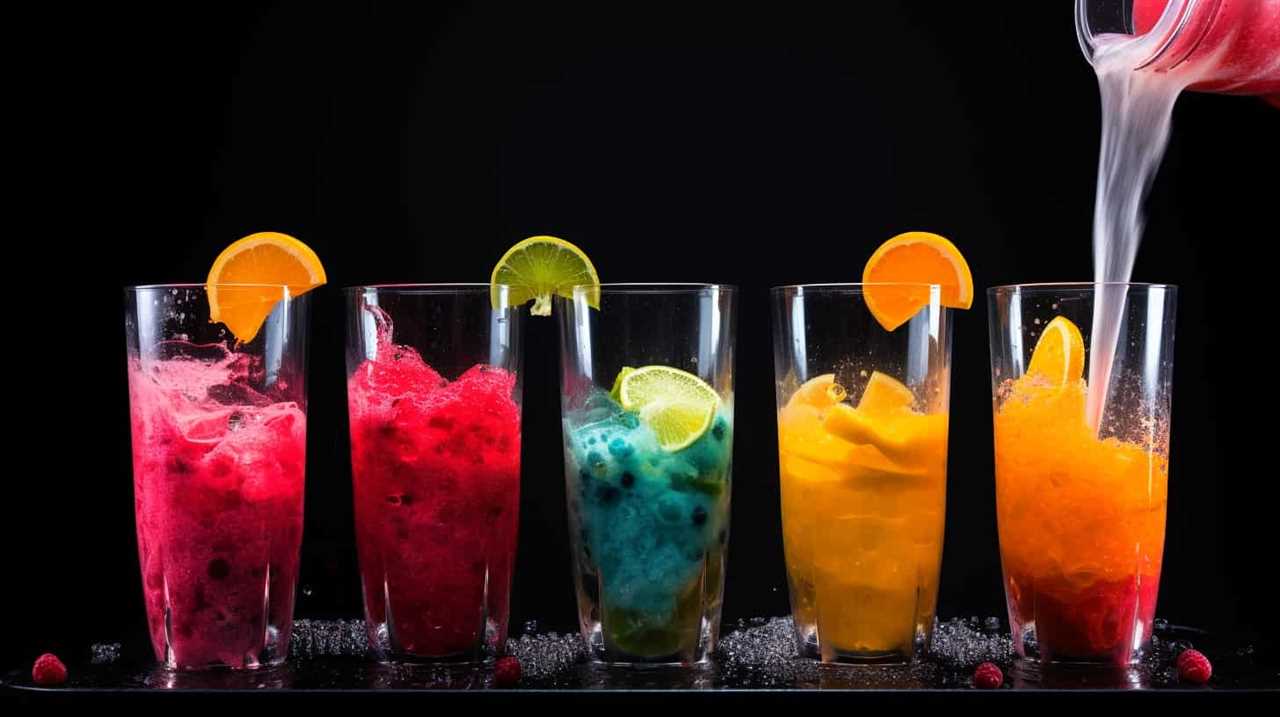
When it comes to orange juice, color is a crucial factor to consider. As oranges are exposed to air, an oxidation process occurs, which leads to changes in color. Fresh orange juice has a vibrant orange hue, indicating its freshness and high nutritional value.
However, as time passes, the juice may undergo a color change, turning dull or brownish. This change in color is a result of the oxidation process, which affects the flavor and quality of the juice. It’s important to note that while a change in color doesn’t necessarily mean the juice is bad, it does indicate that the juice is losing its freshness and shelf life extension.
Therefore, it’s advisable to consume orange juice when it’s at its freshest, as indicated by its vibrant orange color.
Strange Smells in Orange Juice
When it comes to evaluating orange juice, we should be cautious of any strange smells or odors. A fresh, pleasant smell is indicative of good quality orange juice. However, if you notice any unusual or off-putting odors, it may be a sign that the juice has gone bad. These smells can range from a sour or fermented scent to a rancid or moldy aroma.

It’s important to note that while some natural variations in scent can occur due to the specific variety of oranges used, any strong or unpleasant smells should raise concerns. If you have citrus fruit allergies, it’s especially important to pay attention to the smell of orange juice, as it could indicate the presence of spoilage or contamination.
Ensuring the quality of orange juice is essential as it’s a popular beverage known for its health benefits, including being rich in vitamin C and antioxidants.
Off Taste of Orange Juice
Our taste buds can detect even the slightest hint of an off taste in orange juice, which can indicate that it has gone bad. The taste of orange juice should be fresh, tangy, and slightly sweet. If it tastes sour, bitter, or fermented, it’s likely spoiled.
One common cause of an off taste in orange juice is the use of overripe oranges. When oranges become overripe, their flavor profile changes, resulting in a less pleasant taste. Another factor to consider is the expiration date. Orange juice that has passed its expiration date is more likely to develop an off taste. It’s important to check the expiration date before consuming orange juice to ensure its freshness and quality. Additionally, improper storage conditions, such as leaving the juice at room temperature for extended periods, can lead to the development of unpleasant flavors. Storing orange juice in the refrigerator helps maintain its freshness for longer. For those exploring different juice options, aloe vera juice flavor tips suggest pairing tart juices with milder flavors to balance the overall taste.
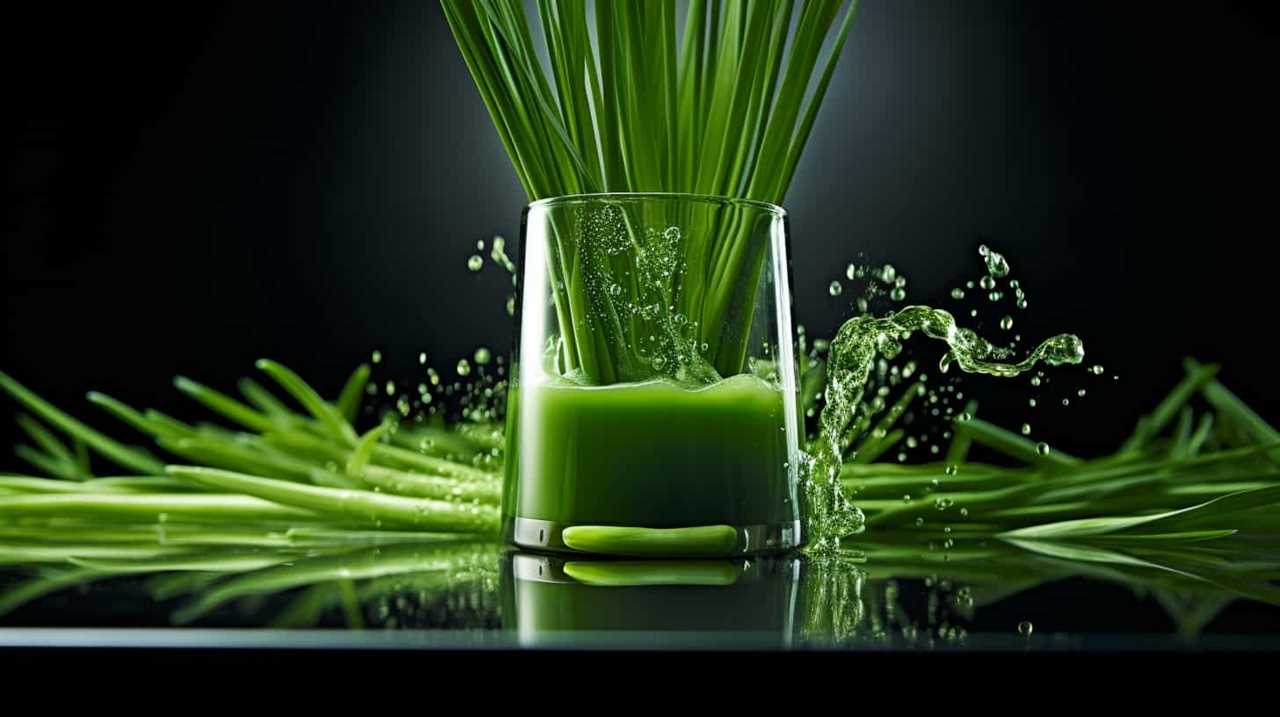
Now, let’s move on to discuss the texture changes in orange juice.
Texture Changes in Orange Juice
As we explore the texture changes in orange juice, it’s important to note that certain factors can cause it to become thicker or develop sediment. One common texture change in orange juice is pulp separation, where the pulp separates from the liquid and settles at the bottom. This can occur naturally over time, as the pulp particles become denser and sink.
Another factor that can affect the texture of orange juice is the expiration date. As orange juice ages, it may start to develop a thicker consistency and even form sediment. This is a result of the natural breakdown of the juice’s components. Therefore, it’s crucial to check the expiration date on orange juice and consume it before it reaches its expiration date to avoid any undesirable texture changes.
Mold or Growth in Orange Juice
We need to be aware of the possibility of mold or other growth occurring in orange juice. Mold can develop in orange juice if it isn’t stored properly or if it has passed its expiration date.
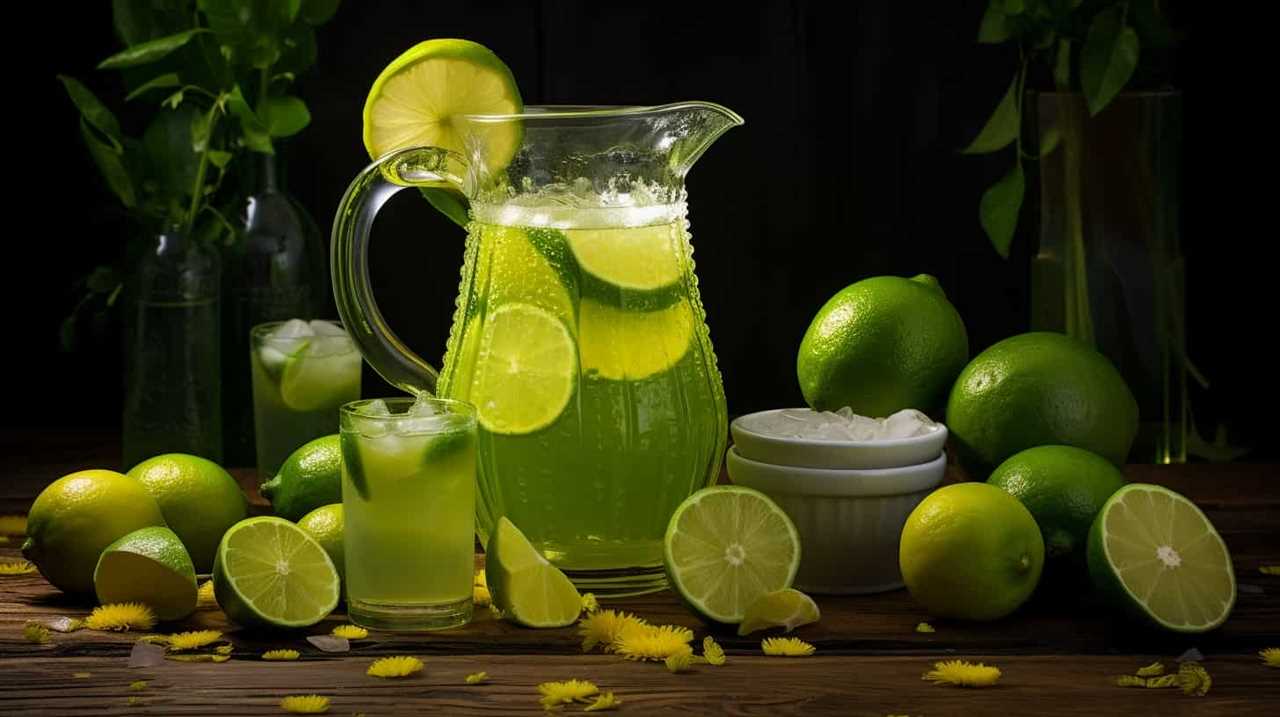
To prevent mold growth, it’s important to follow these steps:
- Store orange juice in the refrigerator at a temperature below 40°F (4°C).
- Check the expiration date on the bottle before consuming. Discard any orange juice that has expired.
- Keep the container tightly sealed to prevent air and moisture from entering, as these can promote mold growth.
Regularly inspecting orange juice for any signs of mold or unusual growth is essential. If you notice any discoloration, a strange odor, or visible mold, it’s best to discard the juice to avoid any potential health risks.
Frequently Asked Questions
Can Orange Juice Go Bad if It’s Stored in the Freezer for Too Long?
Frozen orange juice can potentially lose its nutrients and change its taste if stored in the freezer for too long. It is important to check for signs of spoilage before consuming it.
How Long Can Orange Juice Stay Fresh in the Refrigerator Once It’s Opened?
Once opened, orange juice can stay fresh in the refrigerator for about 7-10 days. To maintain its freshness, store it properly by keeping it tightly sealed and at a consistently cold temperature. If the orange juice develops an off odor, flavor, or appearance, it’s best to discard it to avoid any potential health risks. Factors like exposure to air and varying temperatures can influence how long orange juice lasts, so it’s crucial to handle it with care. Always check the expiration date as a general guide, but remember that proper storage can extend its freshness slightly. Additionally, avoid leaving the orange juice out at room temperature for extended periods, as this can significantly shorten how long orange juice lasts. Freezing the juice can be another option to extend its shelf life, but be aware that this may alter its texture and taste once thawed. By following these precautions, you can ensure your orange juice stays fresh and safe to consume.
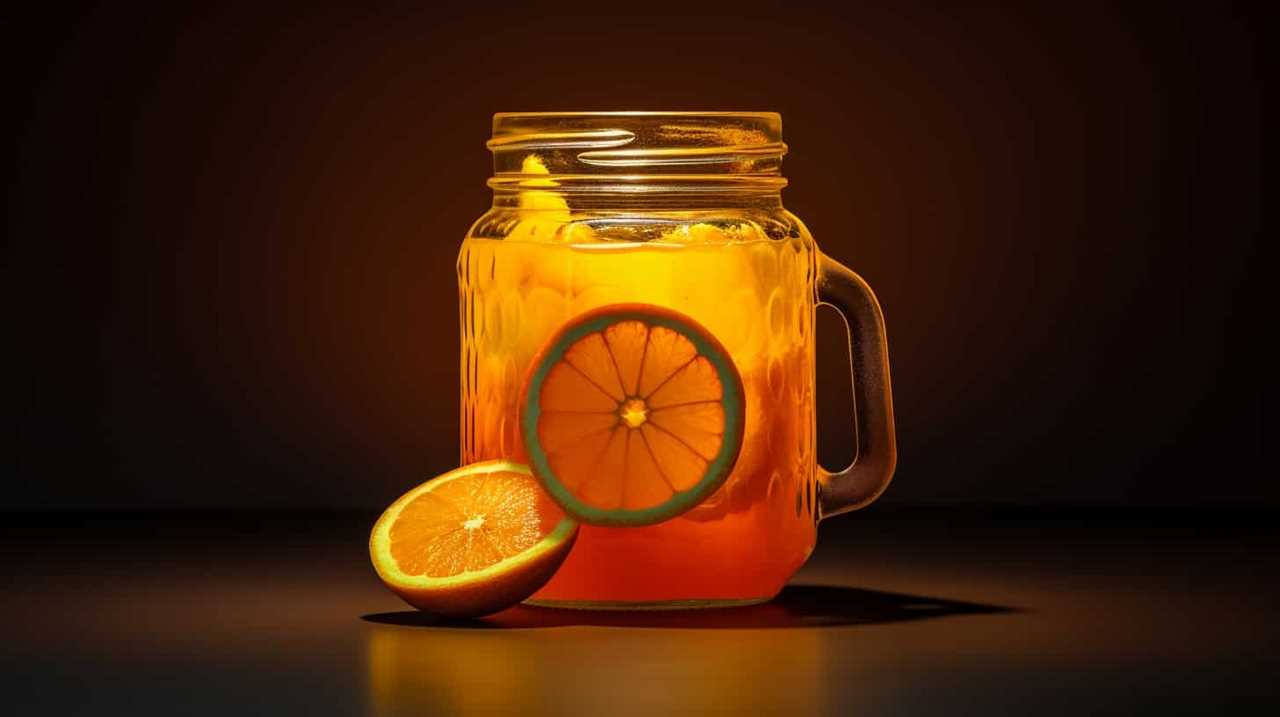
Is It Safe to Consume Orange Juice That Has Been Left Out at Room Temperature Overnight?
Left out orange juice may not be safe to drink as it can harbor harmful bacteria. Signs of spoiled orange juice include a sour smell, mold growth, and a change in color or taste.
Can Orange Juice Develop Harmful Bacteria if It’s Past Its Expiration Date but Still Looks and Smells Fine?
Orange juice can cause food poisoning if it develops harmful bacteria, even if it looks and smells fine. Signs of spoiled orange juice include a sour smell, mold growth, and a change in color or taste.
Does the Nutritional Value of Orange Juice Decrease as It Starts to Go Bad?
As orange juice goes bad, its nutritional value decreases. The longer it sits on the shelf, the more nutrients it loses. Signs of spoilage include a sour smell, off taste, and mold growth.
Conclusion
In conclusion, determining if orange juice is bad requires careful observation of color changes, strange smells, off taste, and texture changes. Just like a detective investigating a case, we must rely on our senses to detect any signs of spoilage.
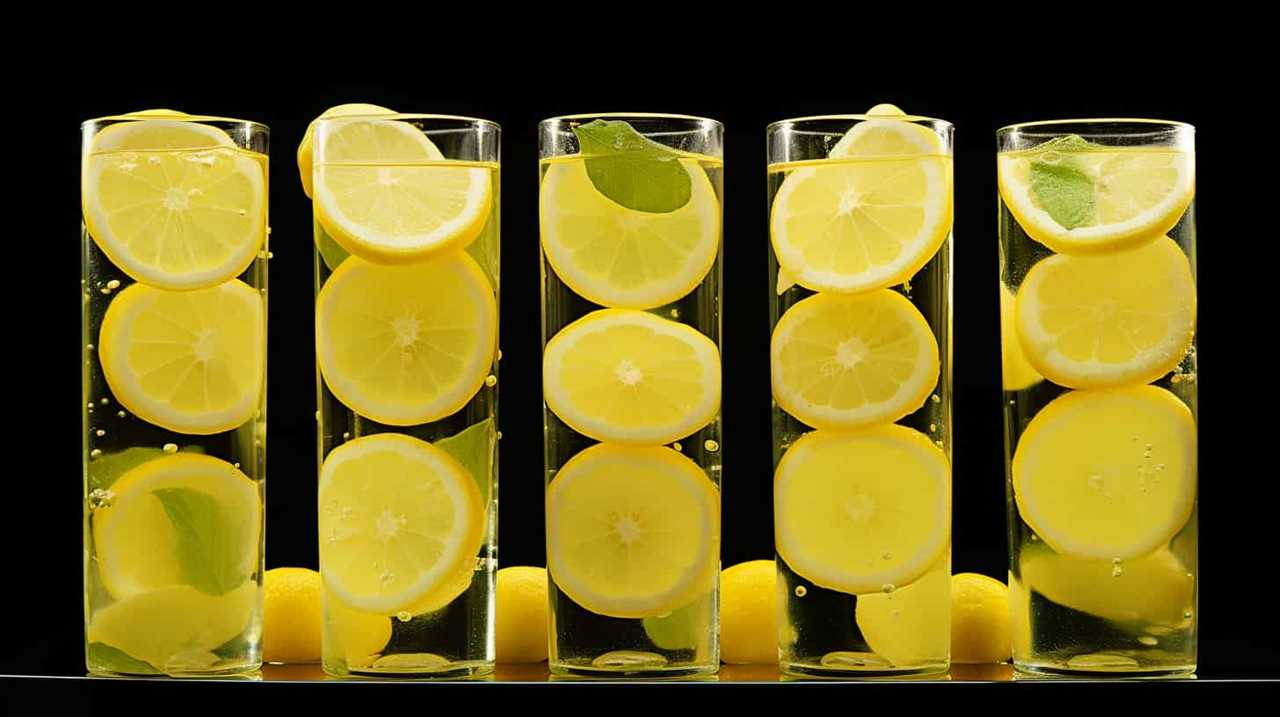
If we detect mold or growth in the orange juice, it’s a clear indication that it’s no longer safe to consume. By remaining vigilant and attuned to these indicators, we can ensure that our orange juice is always fresh and enjoyable.
Susannah expertise lies in researching and compiling evidence-based content on juicing, nutrition, and overall health. She is committed to ensuring that The Juicery World offers accurate, up-to-date, and trustworthy information to empower readers to take control of their health. Susannah’s goal is to inspire individuals to embrace juicing as a way to nourish their bodies and live their best lives.
-

 Vetted2 months ago
Vetted2 months ago15 Best Juices for Diabetics: Refreshing Options That Won’t Spike Your Blood Sugar
-

 Vetted2 months ago
Vetted2 months ago15 Best Decaf Coffee Options for Flavor Lovers Who Need a Caffeine Break
-

 Vetted2 months ago
Vetted2 months ago15 Best Espresso Ground Coffees to Elevate Your Morning Brew
-

 Vetted2 months ago
Vetted2 months ago15 Best K-Cup Coffee Pods for a Perfect Brew Every Time
-

 Vetted2 months ago
Vetted2 months ago15 Best Beans for Espresso: A Guide to Perfecting Your Brew
-

 Vetted2 months ago
Vetted2 months ago15 Best Inexpensive Espresso Machines That Brew Quality Coffee on a Budget
-

 Vetted2 months ago
Vetted2 months ago15 Best Kona Coffees to Savor the Rich Flavors of Hawaii
-

 Vetted2 months ago
Vetted2 months ago15 Best Cold Brew Coffees to Keep You Refreshed All Summer Long




